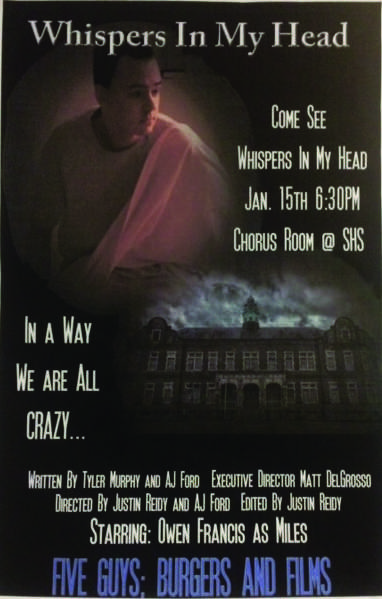When watching a movie, do you ever ask questions? Not questions about whether the protagonist will chase after the woman he loves as she boards the next flight to California; but questions regarding the acting, the lighting of the room, the song choices, and the cinematic techniques used by directors and producers. There’s more to a film production than the story it tells. Amazingly enough, students at our very own school have discovered what it’s like to be the ones behind the screen, rather than those in the audience.
You may have seen the poster for the student production Masque, which draws the eye to a mysterious masked figure. Or you may have spotted the poster for Premonition, which looks like the beginning of a horror movie, with a woman lying in bed, unaware of the dangerous figure lurking above her. At first glance, you may think these posters are advertising for new movies playing in theaters. If you take a closer look, you’ll realize all the people featured in the film posters are your own friends and peers.
Taught by Mr. Lynch, Literature to Film is a class where students are challenged to unearth the hidden meaning of film productions and cinematic techniques, just as archaeologists discover the mysteries of the earth. According to Mr. Lynch, a successful class depends on students realizing what makes a good story and interpreting films in a way that brings out complex themes and ideas. As the class came to a close, students began working on their final projects which required them to create their own adaptation of a short story of their choice.
“With such busy schedules as student athletes, we all had many overlapping commitments and it was hard to find a time when each member could be there,” said senior Erin Martin.
Apart from trying to coordinate schedules, students also had to figure out how to make their films as captivating as possible. As senior Mia Broderick put it, “I have a whole new appreciation for those who are successfully able to convey storylines with clips and footage.” In many senses, directing is a constant juggling act for students and professionals alike.
While directors and producers have to make important decisions about dialogue and cinematic techniques, actors have an entirely different challenge.
“I was an actor and the hardest part was trying to stay serious while filming,” said senior Owen Francis. Actors also have to portray their characters in a way that’s believable to the audience.
Although filmmaking is not an easy skill to master, Mr. Lynch was very pleased by the students’ willingness to take risks in front of the camera.
“The most rewarding part was being able to show our final projects to friends and parents on premier night because they were so impressed at how successfully we created films that they could understand and be entertained by,” said senior Corey Murray.
Indeed, the fruits of their labor were reflected by many moments of thunderous applause that night.
